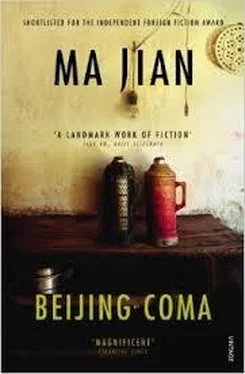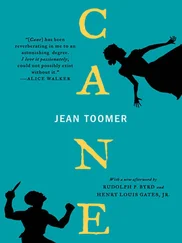‘One day during the Cultural Revolution my mother put on a white face-mask,’ she mumbled, resting her head on my lap again. ‘Her bosses thought she was accusing the Party of starting a White Terror… She was summoned to a criticism meeting… The Red Guards stripped her and shaved off her pubic hair… She was so humiliated she killed herself the day after.’
‘My mother was shaved by the Party and labelled a rightist’s wife but she remained a devout Communist. Perhaps your mother had lost her faith in the Party.’
At that moment, a hundred motorcyclists known as the Flying Tigers roared into the Square, followed by a cavalcade of residents on bicycles and tricycles. They came every morning to deliver donations of milk, bread, fried dough sticks, hot porridge and pickles to the students who weren’t fasting.
‘So we’re on Day Five now,’ Tian Yi said, her eyes wide open. ‘Why does my mouth feel so numb?’
I panicked. ‘That’s a sign that you’ve reached your limit. I’ll take you to the emergency tent and tell them to give you a glucose transfusion. Then you must start eating again.’
It was getting very hot. A student was handing out ice lollies. I took one, and knowing that Tian Yi didn’t have the energy to chew, I bit off a corner and put it in her mouth. ‘I’ll get some water to warm your hands,’ I said, but suddenly her face went stony white. Her lips were motionless, her eyes glazed over. ‘Nurse, nurse!’ I shouted. ‘Come here! My girlfriend has passed out!’
I removed the ice from her mouth and buttoned up her shirt. I was about to heave her onto my back when the nurse ran over and yelled, ‘Don’t lift her! Put her down flat on the ground!’ She and I then placed Tian Yi on a stretcher and carried her to the emergency tent, where a doctor put her on a drip.
‘Thanks for helping,’ I said to the nurse, and sighed with relief when I saw the intravenous fluid trickle down the tube into Tian Yi’s arm.
‘You must be careful when someone faints,’ she said. ‘If you lift them by their hands and feet, it puts pressure on the heart.’
‘Is she going to be all right?’
‘She’ll be fine after this transfusion. What subject are you studying?’
‘I’m doing a PhD in molecular biology at Beijing University,’ I said.
‘We’re both scientists, then. I studied pharmacology at Beijing Medical College.’
‘Aren’t you afraid you’ll get punished for helping the students?’
‘General Secretary Zhao Ziyang has praised your movement, and besides, the whole city has come out here to support you. The law can’t punish a crowd.’
‘What work unit do you belong to?’ I asked.
‘You sound like a policeman. All right, I’ll give you my details. My name is Wen Niao. I work at the Beijing Pharmaceutical Research Institute. It’s so boring there. When I first joined, I felt I was slipping into my grave.’ As she looked up at me a few wrinkles creased her forehead. Her face was similar to Tian Yi’s, but the bridge of her nose was a little higher, her eyebrows thicker.
‘You’re sure she’ll be all right?’ I said, glancing back at Tian Yi.
‘Another fifty hunger strikers have fainted already this morning. They’ve reached the limits of their endurance. I hope that by tonight the strike will be called off.’
‘If it is, then their efforts will have been in vain. The government still hasn’t agreed to our demands.’ Whenever I spoke to a nice girl, I tended to express opinions opposite to my own.
‘They shouldn’t put their lives at risk,’ she said. ‘You’ve already achieved a lot. You’ve shaken the government’s authority and got the Chinese people on your side. But if you continue this occupation any longer, things will go wrong. In June, the temperatures will soar, and you’ll have epidemics breaking out.’ Wen Niao had an annoying voice. It kept jumping from a high squeak to a low croak. Her neck was very slender so I guessed she had a narrow larynx.
‘I could never go on hunger strike,’ I said. ‘“Man is iron, food is steel, two missed meals and down he keels,” as the saying goes.’
A male doctor came over and asked me, ‘Does your girlfriend have any history of illness?’
‘Why? What’s the matter?’ I said, panicking again.
‘Her heartbeat is very erratic.’
‘She suffers from hypoglycaemia. And she’s claustrophobic as well. She fainted once when we were in a crowded train.’
‘She shouldn’t have joined the hunger strike, then. We’ll have to send her to hospital. Wen Niao, go and call an ambulance.’ Then, turning to me again, he asked, ‘Do you know her blood group?’
‘O. I’m O too. I’ll go with her to the hospital.’
‘Quickly, there’s just once space left in the ambulance,’ Wen Niao said, running back. ‘Help me carry her over.’
You’ve been fasting for three years, motionless as a hibernating snake.
I remember pushing my brother onto the floor when we were kids. I see him sobbing on the ground, next to three bottle-tops, a comb and a small stick of chalk. Then I see my father towering over us, shouting, ‘Shut up! Shut up!’
My mother is listening to the lottery results being announced over the radio while she tries to find space for the new objects she’s bought. She copies the number of her lottery ticket into a notebook, and promises me that when she wins, she’ll get a telephone line installed.
Someone knocks on the front door and my mother goes to open it.
‘Have the police come round again recently?’ asks Zhu Mei as she enters and sits down on the sofa. This is her second visit. Her husband was shot dead by the army on Changan Avenue.
‘They’re always turning up,’ my mother grumbles. ‘They saunter in here as though it was a supermarket, but they don’t have the politeness to check their hats or bags in at the door. They’re waiting for my son to wake up so they can send him to prison. He’d be better off dying in this flat rather than rotting in one of their jails.’
My mother has mentioned that the old covered market on the street outside has been turned into a supermarket. The food is wrapped in plastic, and customers can help themselves to the products they want. The only drawback is that they have to check their bags in at the entrance.
‘If he died now, the government would assess his case and label him a counter-revolutionary thug,’ Zhu Mei says. ‘After my husband was killed, he and I were both branded criminals. When the chairman of the Olympic Committee visited Beijing a few days ago, four security officers were posted outside my front door and my building was surrounded by police vans. You’d think I was a murderer or something.’
‘The local neighbourhood committee keeps nagging everyone to support our Olympic bid. Apparently they sealed up the public latrines before the Olympic chairman visited the area, so that he couldn’t smell the stench.’
A radio advert announces that big prizes are being randomly awarded to customers in Haidian Department Store. My mother has been visiting the store regularly for the last six months, buying things she doesn’t need, such as lamps, mirrors, thermos flasks and hot-water bottles, hoping she might win a prize. There are twelve hot-water bottles under my bed now.
‘So you went to the cemetery during Grave Sweeping Festival?’ my mother asks.
‘The police told me not to go. They warned me not waste money buying flowers or offerings, because the gates would be locked and no one would be allowed in. But I thought, damn them, and went anyway.’
‘They came here too. They know that students killed in the crackdown have been buried in the cemetery, in contravention of guidelines. Last year, foreign journalists got in and photographed relatives burning paper money on the students’ graves. The police told me that anyone entering a cemetery during Grave Sweeping Festival would be in trouble. If my son dies, I won’t bury him in a cemetery. I’ll keep his ashes under his bed.’
Читать дальше












